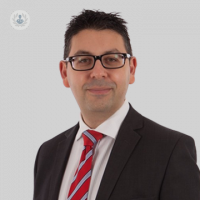Frozen shoulder: What you need to know
Escrito por:Frozen shoulder, also known as adhesive capsulitis, is a condition that causes pain, stiffness, and loss of movement in the shoulder. This can be a debilitating experience for many people, significantly impacting daily activities and overall quality of life.
The good news is that there are some very effective non-surgical improvements which can bring about a rapid recovery. Read on! Mr Ronnie Davies, distinguished consultant shoulder and elbow surgeon, provides an expert insight.

What is frozen shoulder?
Frozen shoulder is a condition that results in pain and stiffness in the shoulder. The shoulder joint is the most flexible joint in the body. This is possible because the lining of the joint (called the capsule) is usually very thin and stretchy.
When you get frozen shoulder, this capsule becomes inflamed and tight, losing its stretchiness and becoming painful.
What is it like to have frozen shoulder?
Frozen shoulder typically develops in stages, each with its own symptoms:
- Freezing stage: Initially, the shoulder is very painful as it becomes stiffer and stiffer. I often call this the “red hot” phase of frozen shoulder rather than the “freezing” phase. It usually lasts a few weeks to months.
- Frozen stage: The pain settles, but movement is very limited. During this stage, it is often difficult to lift the arm to put on deodorant, and people struggle to wash their hair and tuck themselves in due to the loss of movement. People often describe sharp, sickening pains when they make a sudden movement.
- Thawing stage: During this recovery phase, the shoulder begins to improve as stiffness gradually decreases and range of motion returns. Complete recovery can take up to three years.
What causes frozen shoulder?
The exact cause of frozen shoulder isn’t always clear, but several factors increase the risk of developing this condition. It can be triggered by an injury or surgery.
Additionally, certain medical conditions increase the risk of frozen shoulder, such as diabetes and thyroid problems. In many cases, frozen shoulder occurs without any obvious cause, which is known as idiopathic frozen shoulder.
How is frozen shoulder treated?
The first thing to know is that frozen shoulder usually gets better by itself, but this can take three years. Treatments are aimed at shortening the recovery, and most cases of frozen shoulder improve with non-surgical treatment methods. The recommended treatments include:
Physiotherapy
A musculoskeletal physiotherapist will design a customised exercise plan to improve shoulder mobility and strength, focusing on stretching the joint capsule and restoring range of motion. Physiotherapy is really important alongside other treatments too.
Hydrodilatation
This is a specialised injection of steroids, local anaesthetic and fluid into the shoulder joint. This settles down the pain and inflammation and can restore much of the movement in as little as a few days or weeks.
Is surgery necessary for frozen shoulder?
Surgery is rarely needed for frozen shoulder. However, if other treatments fail to restore movement after several months, or if the condition severely affects quality of life, surgery may be considered.
The most common surgical option for frozen shoulder is arthroscopic capsular release, a keyhole operation where the surgeon uses a small camera (called an arthroscope) to view the inside of the shoulder joint. Small incisions are made, and specialised instruments are used to cut through the thickened, scarred capsule to release the joint and restore movement.
Facts about frozen shoulder
Frozen shoulder is a bit lightning, in that it doesn’t strike twice… in the same shoulder. However, if you have frozen shoulder on one side, there is a 50% chance of getting it on the other side within five years. If you recognise the symptoms, it is important to see a shoulder specialist early as this can stop the problem in its tracks.
Mr Davies offers a one-stop frozen shoulder clinic for diagnosing and treating frozen shoulder during the same visit. If you would like to book an appointment with Mr Davies, head on over to his Top Doctors profile today.


